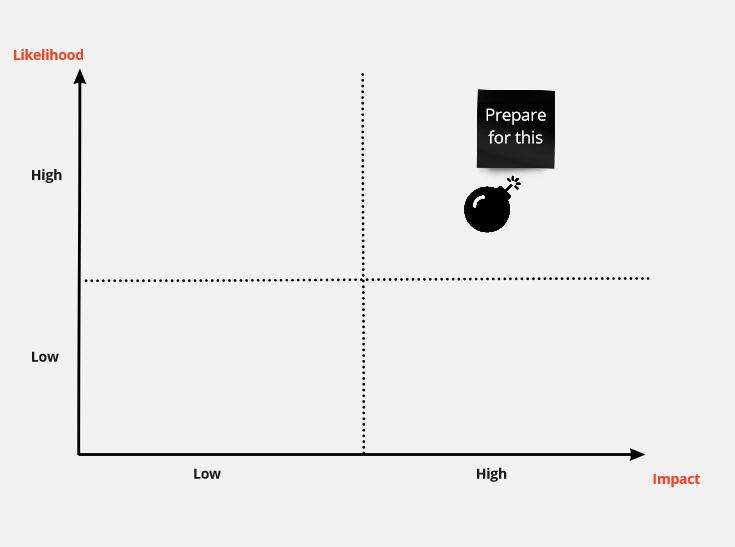I selected these 3 courageous questions for you to ask because they will boost the effectiveness of whoever you coach, be them teams or individuals.
Why should you care?
I’m glad you ask. That’s the agile coach in you protecting your ROI of learning!
Whenever you ask questions as an agile coach you make them count. Your questions shouldn’t be frustrating or “matter of fact”. The questions you ask must generate insight and possibility. You have the upper-hand as you look at what happens a little bit in an helicopter view.
Many times, depending on context and culture, you are one of the few people in the room that can ask those questions without consequences to your reputation. You are sometimes the first person to dare ask, at least while everybody is warming up to the idea of bold questions. But in no time they will be modelling your behavior, and it will be quite the experience to notice that a little bit of the language and approach are borrowed from you.
You know then how helpful you’ve become!
Let’s take a look at these 3 questions, why they are courageous and how they are helpful.
Who’s gonna care if this is not done?
Many things are revealed with this question.
The first, is that if you can answer that question you know who asked about that work. You know who cares enough about its results. If you know that, you most likely also know what the impact is of not doing it, which is one of the most important metrics for proper prioritization: Not who asks, but what it impacts.
A person getting upset that their request was not done is different than revenue impact. Or risk exposure. When the question is properly answered, you’d go beyond “Paul from finance”. You’d answer something like: “all the customers waiting for their tax slips, and it happens once a year, so if this does not get done by October 30th, we risk losing up to 80% of our revenue”.
If you don’t know how to answer any part of it, asking that question exposes the reality that as a team (an managers are included) you let a request come in that might not merit the urgency and attention it’s receiving. Which is a great point for improvement in your process.
But even if you have yet to discover the who, there’s no shame in that. The whole point of this question is to find the people who can negotiate whatever might be needed so that the work that you think you should be doing can be vouched for.
Many people discount the good old stakeholder map, but I find every effective team holds a similar list or map. That’s merely the beginning of it, though. Yet, like we just saw, it starts with tying the who with what they are interested in.

This question is courageous, because it challenges the assumption that everything is important and reminds people that not everything gets done, only what truly matters. In fact, it turns it all in its head: we assume not doing it until the impact is properly assessed and it also assumes someone is clearly expectant of those results. After all, it’s quite demoralizing to a team to work hard on something that in the end collects dust instead of being long awaited and heavily utilized.
The question boost effectiveness in both current work to be done and in the overall team (or department, business) process, which gets reshaped.
How can we make this meeting more effective?
We all complain about meetings. Many make the joke of “it could have been an email”.

While people do try and protect their time by sometimes rejecting meetings or showing up and doing “silent work” while off camera in online meetings, in reality, ask yourself: how much are you truly doing to improve your meetings?
Notice I didn’t say “to make the meetings better”, because better is subjective. Effectiveness speaks of making things productive, successful. That can be measured to improvement.

The point of any meeting should indeed be that of getting results, and it all starts with a clear objective, the proper audience present and a structure that allows for the conversation to reach the desired outcome.
But despite some of these heuristics, you should be asking this question by the end of your meetings: “How can we make it more effective?”
First, it will literally raise the potential for the next meeting a better session. That’s learning.
Second, it will normalize the fact that any meeting can be more effective, and people have a free space to speak without having “the one who brought it up” that the meeting was too long or too disorganized. It was asked.
The question is courageous because it speaks of what everybody else thinks and rarely says. And it boots effectiveness as people will take steps into having a better ROI of their time, with more valuable meetings that they might actually start looking for!
What could derail the plan?
That’s an elephant in the room type of question.
Let’s give credit where credit is due, this famous quote was first uttered by a Prussian general in the 1800’s, so let’s consider it for a moment:

What we know is that plans are not a statement of the truth. They are great tools to look ahead and play with possibilities. So, it’s kind of surprising that people don’t spend enough time imagining less than ideal scenarios in the realm of possibilities. You should. We all should.
From being short-staffed to looking at a nagging dependency from another team, nothing is off-limits when imagining what can break the plan. So what if you could get creative and _dare I say it_ even have fun with destroying the plan?
Think real scenarios. Think very unlikely scenarios. For example, what happens if you have just half the team? Can this thing still be done? The point is to explore even improbable ideas because you never know… I mean, who could have said a pandemic was true possibility years ago?
Other than the perverse fun of destroying things hypothetically and not in reality, there are other benefits. Everybody gets to understand the extension of inter-dependencies and speak out loud about fears they face, even if the chance of true disaster is small. This type of approach allows all parties involved to uncover what’s non-negotiable and what must be true for that piece of work to progress no matter what.
And you know what’s more? If you hear a lot about systems thinking out there and are not sure about how to use it, that’s one clear, straightforward application of it.
You should know scenario-based strategic planning is so relevant that robust organizations ask their senior leaders to do that, instead of just thinking of strategy as something linear.
One thing to remember, though: you can’t possibly plan or prepare for all possible scenarios. So what you want to do is ideate freely first. Brainstorm. Only then you start judging the impact and the likelihood of each of those ideas. Think Eisenhower Matrix with different dimensions.

What’s courageous about this question is how much it’s willing to admin that… well, things can sink, and they can sink deep despite any plan and hope.
What makes it increase effectiveness is that it builds resilience in the team and whoever else is involved. As much as you can see what it takes to break the plan, you also get more creative and smarter about planning around it.
In conclusion
What do you think about these courageous questions you could ask your teams to boost their effectiveness?
Have you tried any of them or anything similar?
If you are wondering, why courageous questions, remember that courage is one of the values extraordinary coaches should uphold. To be truly helpful as an agile coach you have to be willing to be at least a bit disruptive.
And if by any chance you feel shy or unsure, remember as an agile coach you are not there to save face. You are invited to support people by showing them what they would otherwise not see. Or maybe they would, but it would take a much longer time to do so on their own! You are short-cutting learning for your clients!



